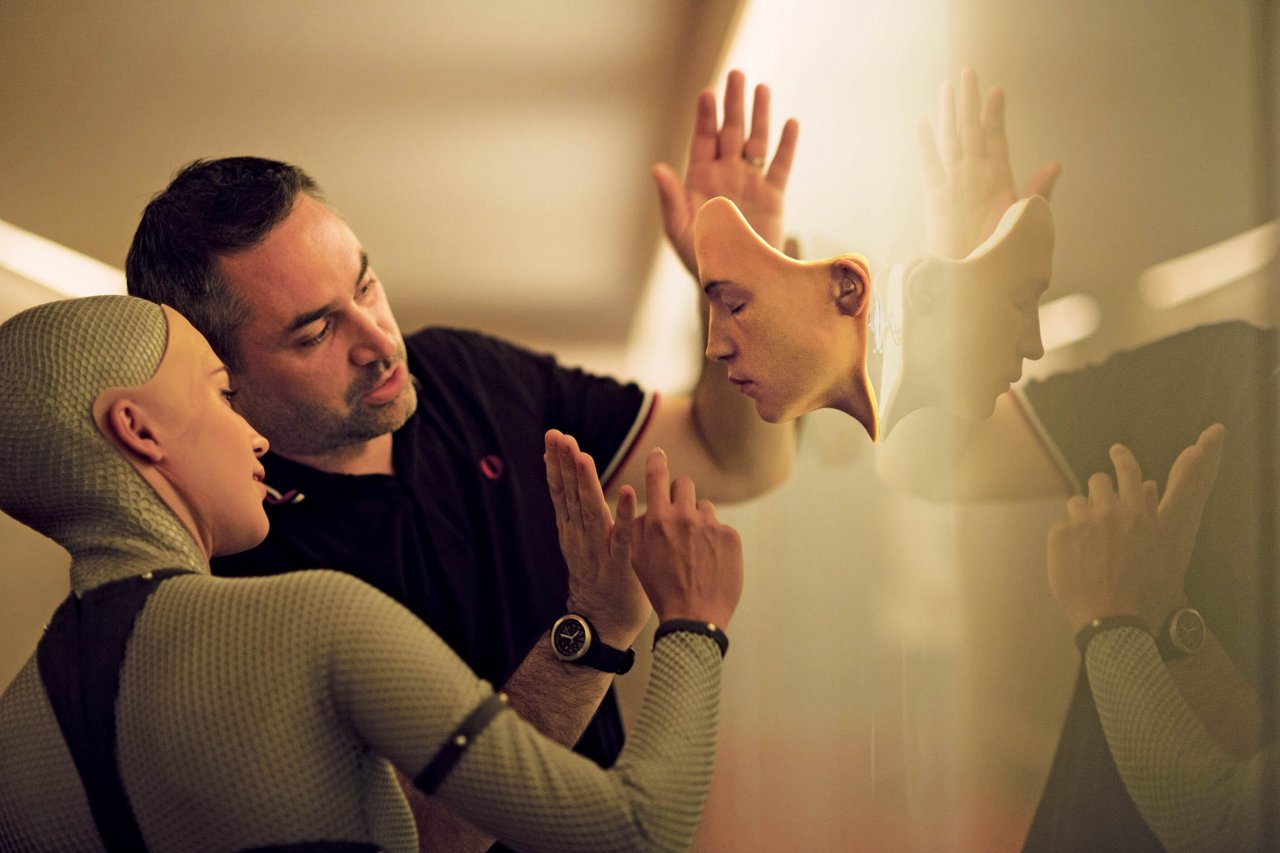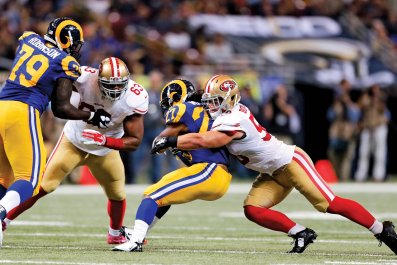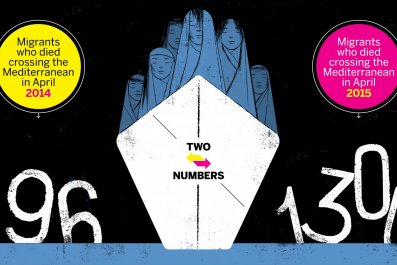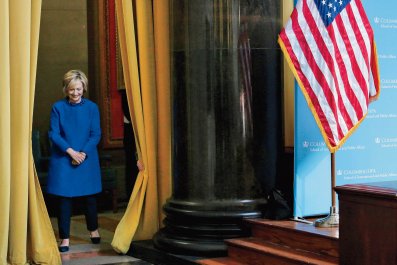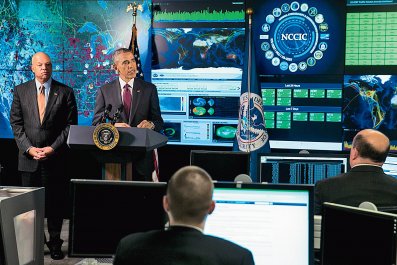"If you've created a conscious machine, it's not the history of man," Caleb, a young programmer played by Domhnall Gleeson, tells his genius boss Nathan in Ex Machina, the dazzling new AI flick from writer/director Alex Garland. "That's the history of gods."
Welcome to the future, in whatever year Ex Machina takes place (it's never specified). In most ways, its hyperintelligent reality seems far off. That's because Nathan, a reclusive CEO played with brogrammer chill by Oscar Isaac (Inside Llewyn Davis, A Most Violent Year), has invited Caleb to his secluded house-turned-laboratory to show off Ava (Alicia Vikander), the artificially intelligent humanoid he's built. "What do you think?" he asks his employee winkingly, though we can tell that Nathan's interested in more than just a product assessment.
And there, confined to Nathan's faraway, super-controlled den, this claustrophobic thriller unwinds in a series of "sessions" between Caleb and the bot. Ava is gorgeous, if you don't mind scaly mechanical coils filling in the female form, and sharp too. She answers Caleb's queries, pokes flirty fun at his word choices and, intriguingly, instigates recurring power glitches, when Nathan's video surveillance shuts down just long enough for the bot to slip Caleb ominous warnings. She knows something. Those moments when Nathan isn't listening are rare; that's the first clue that Ex Machina's setting has more to do with the present technological milieu than it appears.
The film's unraveling is as slow and methodical as you imagine Nathan's creation process to be, and frequently invokes the Turing Test. Named for computer scientist Alan Turing, the test is passed when an evaluator conversing with both a person and a machine cannot, after repeated attempts, tell which is which. By those standards, Ava "is incredible," Caleb gushes, his laboratory detachment melting into genuine infatuation. As Ex Machina heads toward its showdown, Ava's presence elevates the film into a futuristic vision that's as beautiful as it is paranoid. In Garland's words, Ex Machina was "all about Ava before I even had written the first line."
But despite these far-off technological leaps, Ex Machina feels very much a part of the current cultural moment, in which great big tech companies have grown nearly as powerful as the governments that try—and often fail—to regulate them. Consider Bluebook, the company where Caleb works and for which Nathan wrote the code at the age of 13. It's the Internet's most popular search engine. In one snatch of dialogue, we learn that it draws 94 percent of all Internet search traffic. Sound like Google? It's not directly based on the search giant, Garland says in an interview with Newsweek. But it is based on a more generalized anxiety about the power companies like Google and Facebook wield.
"I have no idea whether anything that any of these big companies does is evil or wrong or problematic," explains Garland, a novelist-turned-filmmaker whose screenplay credits include Never Let Me Go and 28 Days Later. "My position is that they're very powerful. And in that respect, it doesn't matter whether they're doing anything wrong or not. If you're that powerful, you need oversight, because our history, with very powerful people and organizations, is that they need oversight. Always."
A search engine, separate from whatever services it provides, acts as a massive data repository. By one estimate, Google holds more than 10 exabytes' worth of data—that's about 625 million standard 16-gigabyte iPhones. Much of it, presumably, is X-rated. Similarly, Facebook can tell with a significant degree of accuracy who you're in a relationship with and who you might date next. In Ex Machina, Caleb wonders if Nathan glanced at his porn preferences and designed to his liking. (Is that supposed to draw a laugh or a grimace of recognition?) The CEO soon reveals that he has harvested data from smartphone cameras around the globe to fast-track Ava's emotional growth. It's a clever hack—and one that taps into any mobile-using human's anxiety about 24-hour self-enabled surveillance.
And other kinds of surveillance too. Shortly before principal photography began on Ex Machina in 2013, Edward Snowden's security leaks prompted an international debate on National Security Agency spying. "For me, the Snowden revelations were very important in many different ways," Garland says. "They drew attention to the problematic ways that tech companies and governments could work with each other, which I think is really serious and really something that should be very alarming.… It confirmed what we feared. But we feared it already."
Garland bristles at the suggestion that the power of Bluebook—and its founder—is a dystopian vision. "It's not dystopian. Because you have very big tech companies now, which may or may not be dystopian," he says. "There's notions of oversight over some of these companies, so theoretical oversight…but is there actual oversight? I don't know." The director says it's ambivalence, not outright alarm, that gnaws at him: "There's stuff about Google I like; there's stuff about power that scares me."
The resulting film is a profoundly anxious movie for an anxious era. It would hardly necessitate a spoiler warning to say that Nathan's experiments in artificial intelligence yield violent and unanticipated results.Ex Machina is more creeping dread than Hollywood action—which proves all the more unsettling. The CEO's sleek playpen becomes a prison. Caleb, ever the experimenter, realizes he's a rat in the maze. Ever been experimented on without realizing you were the subject of an experiment? Ever used Facebook? In one of numerous instances, the social media behemoth took heat for a 2012 experiment that tweaked users' newsfeeds for a study on "emotional contagion."
For Nathan, the brave new singularity beckons, and he's impatient to meet it. "One day," he tells Caleb, "the AI's are gonna look back on us the same way we look back at fossils." Maybe—but not soon. Familiar ethical quandaries aside, a machine like Ava is not quite within reach, the director concedes. True, we've integrated responsive bots like Siri into our daily life. "You end up having those experiences [with robots] if you have a cellphone these days." But, Garland says, "we are not about to have sentient machines. I think it's a distant future for all of us."
And yet artificial intelligence is having a cinematic moment. Spike Jonze's Her, in which Scarlett Johansson voiced the AI operating-system-turned-love-interest Samantha, charmed both audiences and the Academy of Motion Picture Arts and Sciences in 2013. Johansson further explored the post-human seductress genre in 2014's Under the Skin. That same year, in real-world St. Petersburg, a chatbot disguised as a 13-year-old was said to have passed the Turing Test, although Garland is skeptical.
So Ex Machina is poignantly timed, while also fitting into a long tradition of almost-but-not-quite-horror movies in which experiments in what it means to create or re-create artificial human life bring alluring promises and terrifying results. Think Seconds, the chilling 1966 cult flick from John Frankenheimer, or, more recently The Skin I Live In, the artificial skin nightmare from Pedro Almodóvar.
The difference is that Ex Machina's code-crazy creator doesn't much resemble the archetypal mad scientist or social pariah from movies past. He's a more contemporary figure: the CEO of a huge, unwieldy technology company much like the ones whose products we rely on daily. People of Nathan's ilk are in charge of the world—yes, IRL.



